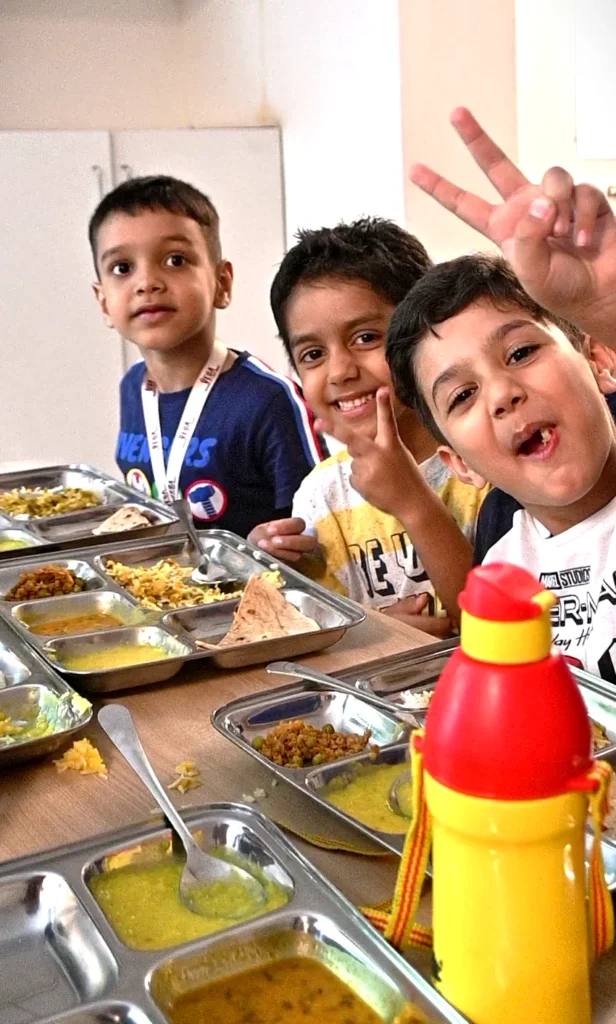While the monsoon provides much-needed respite from the intense summer heat, it also brings with it an increase in foodborne illnesses, colds, the flu, and stomach viruses. Children must be healthy at this time, especially those enrolled in school or college.
The immune system can be weakened by a poor diet, making a person more susceptible to disease, exhaustion, and poorer academic performance. Making the correct dietary choices can promote general health and boost immunity. Here are some crucial foods to add to student lunchboxes and everyday meals that would increase immunity throughout the monsoon season.
Incorporate Vitamin C-Rich Seasonal Fruits
Vitamin C, which is abundant in fruits including papaya, guavas, oranges, and amla (Indian gooseberry), increases the creation of white blood cells. Additionally, these fruits include antioxidants that aid in the fight against diseases and hasten the healing process after illnesses. Pack them fresh or in juices, but stay away from potentially infected juices from the street.
1. Incorporate Vitamin C-Rich Seasonal Fruits
Vitamin C, which is abundant in fruits including papaya, guavas, oranges, and amla (Indian gooseberry), increases the creation of white blood cells. Additionally, these fruits include antioxidants that aid in the fight against diseases and hasten the healing process after illnesses. Pack them fresh or in juices, but stay away from potentially infected juices from the street.
2. Include Turmeric in Everyday Foods
The key ingredient in turmeric, curcumin, which has antibacterial, antiviral, and anti-inflammatory qualities, makes it a classic immune enhancer. Students can increase their resistance to common monsoon diseases by adding a pinch of turmeric to warm milk, dals, or curries.
3. Use probiotics
Immunity is largely dependent on having good gut flora. Consume fermented foods like idli and dosa, as well as natural probiotics like curd, yoghurt, and buttermilk. In the lunchbox, a bowl of flavoured yoghurt or curd rice can improve digestion and guard against gastrointestinal tract infections.
4. Cook the leafy greens thoroughly instead of eating them raw.
During the monsoon season, raw leafy foods like lettuce and spinach can harbour waterborne infections. Avoid eating them raw at all costs. To preserve their nutrients without running the risk of contamination, simmer them thoroughly in soups, spinach rice, or palak paneer.
5. Eat some nuts and dry fruits as a snack.
Rich in vitamins, minerals, and healthy fats, almonds, walnuts, dates, and raisins can boost immunity and focus. They are a great way to get more energy during the day and are simple to pack. Just watch how much you eat to prevent consuming too many calories.

6. Select Cooked and Warm Foods Instead of Cold Ones
Students should refrain from consuming cold or refrigerated foods, such as leftover meals or prepackaged salads. During the rainy season, warm, freshly prepared foods like upma, khichdi, vegetable poha, or parathas are safer and simpler to digest.
7. Include Ginger and Garlic for Organic Defence
The antibacterial and anti-inflammatory qualities of ginger and garlic aid the body in warding off illnesses. They provide robust immune support and provide flavour to stir-fried foods, dals, and soups.
8. Use herbal teas and soups to stay hydrated.
During the monsoon, kids might drink less water, but staying hydrated is still crucial. Promote wholesome soups made with lentils or vegetables, as well as herbal teas like tulsi, ginger, or cinnamon tea. These are immune system-boosting, moisturising, and soothing.
9. Maintain a Fresh and Hygienic Lunchbox
Food can become dangerous if it is not properly packed, regardless of how nutrient-dense it is. Make sure food is kept in hygienic, airtight containers. Steer clear of items that spoil easily, such as shellfish, cream-based dishes, and mayonnaise, during the monsoon season.
10. Steer clear of sugary drinks and street food.
Despite their allure, street cuisine frequently uses tainted water and unsanitary methods. Using safe ingredients, pack homemade versions of your favourite snacks, such as sandwiches, buns, or bhel. Reduce your intake of sugar-filled beverages as well, as they weaken your immune system.
Building immunity throughout the monsoon season can help children stay healthy, energetic, and focused so they can perform well in both academics and extracurricular activities. It’s not only about preventing disease. Clean, cooked, and in-season meals can make a big difference in a well-balanced diet. In order to encourage healthy eating habits, schools and parents should collaborate to prepare meals that are not only delicious but also high in nutrients that strengthen the immune system. Students can experience the wonders of the monsoon season without succumbing to its typical health hazards by making a few thoughtful adjustments.
Vega Schools offers holistic education to children in Delhi NCR and is rated among the top Schools in Gurgaon. Its modern infrastructure, facilities, and experienced teachers are a big asset to the learning & development of students, be it for Nursery, Primary or Senior children making Vega Schools the best schools in Gurgaon. For information about admission please visit the Vega Schools campuses in Sector 48 and Sector 76 Gurugram.
